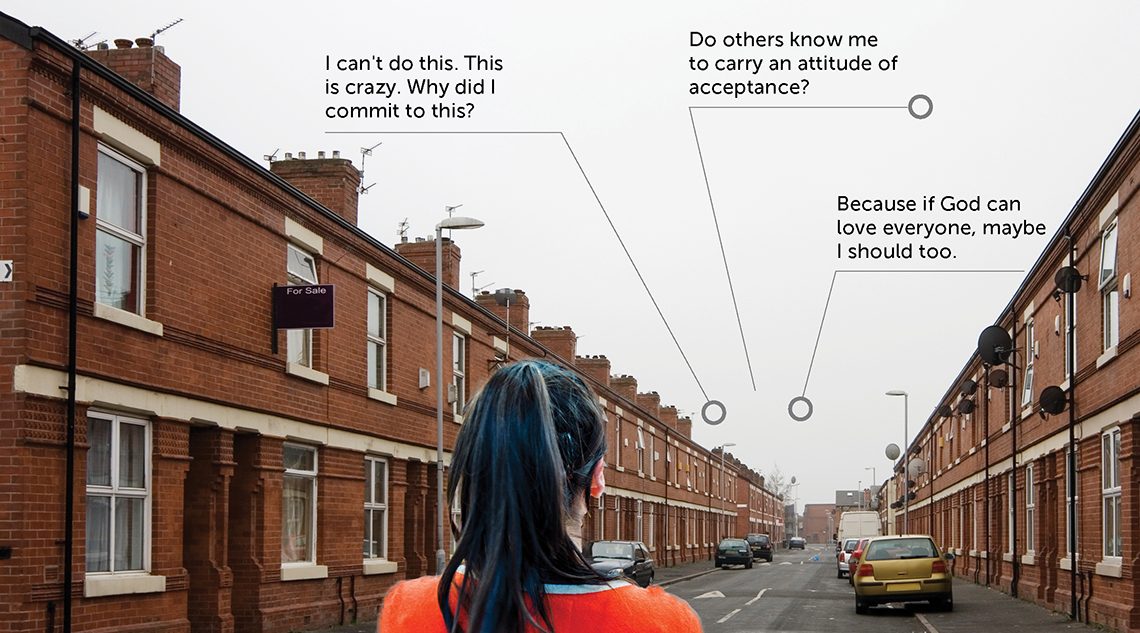I can’t do this. This is crazy. Why did I commit to this?
“Hi, what are you up to?”
“Oh, hello! I didn’t see you in there,” I replied, peeking into the man’s garage. I had nearly skipped his house. His garage stood open, but nerves still made me timid when doing literature evangelism.
Quickly I switched into canvassing mode. “Well, my name is Emily and this summer . . .” My thoughts trailed off. He won’t want a cookbook or devotional. I can already tell. I felt slight guilt for making my assumptions, but it was a dreary day and I needed to work quickly before the rain stopped me.
“Wait, go back. What’s that one?” The man leaned over to see the children’s book. Jesus’ smile shone on the cover of Prince of Peace.
“Oh, this one? Uhh. Well this is a storybook on the life of Christ for kids . . .” I continued my canvas, surprised when he reached into his back pocket and pulled out his wallet.
“Yeah, I’ll support what you’re doing!” His enthusiasm caught me off guard. “I believe in education and would love to give this book to my little boy.”
Dazed, I left the garage. I nearly rejected this home because I didn’t want to break out of my comfort zone. I nearly passed by this man without even speaking to him.
Do I often act this way? Do others know me to carry an attitude of acceptance or do I automatically reject what doesn’t fit in my pristine box of presumptions?
Near miss
LE training taught me to be inviting, accepting. The instant I set foot on another person’s property, I was to open my ears, eyes, heart and mind for ways to connect. When people see us as accepting, they begin to trust us. Without trust, sharing ideas, expressing beliefs and creating conversation is deeply hindered. Without acceptance, there is no connection. In nearly skipping over the man’s house I nearly missed an opportunity to connect.
The rest of that summer I consciously put God first and my presumptions second. If I wanted to reach more people, acceptance was the crucial first step.
Reopening
We don’t have to be literature evangelists to have hearts of acceptance. In our Christian walk, we are often faced with the same question: What do we want to be known for?
My mom once told me, “Our job isn’t to criticize, reject, or judge others. Our purpose is to offer a helping hand, compassion and mercy. We are to do unto others as we hope they would do unto us.” The same principle can be found in the Bible. Jesus gives the commandment in Mark 12:31 to “love your neighbor as yourself.”
This neighborly love and acceptance does not mean we will agree with everything someone says; nor will we idly sit by when wrong occurs. A clear difference exists between agreeing and accepting. Accepting is about caring, about inviting someone in to see what grace has to offer. Accepting others is taking that gift of love God has given us and trying it on for ourselves, even when nerves make us timid. Because if God can love everyone, maybe I should too.
Practicing Acceptance Daily
In an age of technology and fast-paced agendas, how can we open our hearts, minds, ears, and hands to accepting others?
- Pray. Ask for the Holy Spirit to guide you as God opens opportunities where you can share the meaning of Jesus. Meditate on God’s acceptance of everyone. Be inspired by His love.
- Start conversations. Talk with people you wouldn’t normally approach. Ask more than “How are you?” Rather than pushing forward your own thoughts, focus on listening.
- Push judgements aside. If we were all the same, life would quickly get boring. Differences force us to think outside of our usual judgements. Share your opinions respectfully if you disagree. Learn to see and acknowledge other positions before reaching conclusions.
—
Emily “Emy” Wood from Platte City, Missouri is a junior communication major at Union College. This story is part of a series called “Who are we?” from the February 2016 print edition of OUTLOOK, our annual special issue produced by Union College students.









